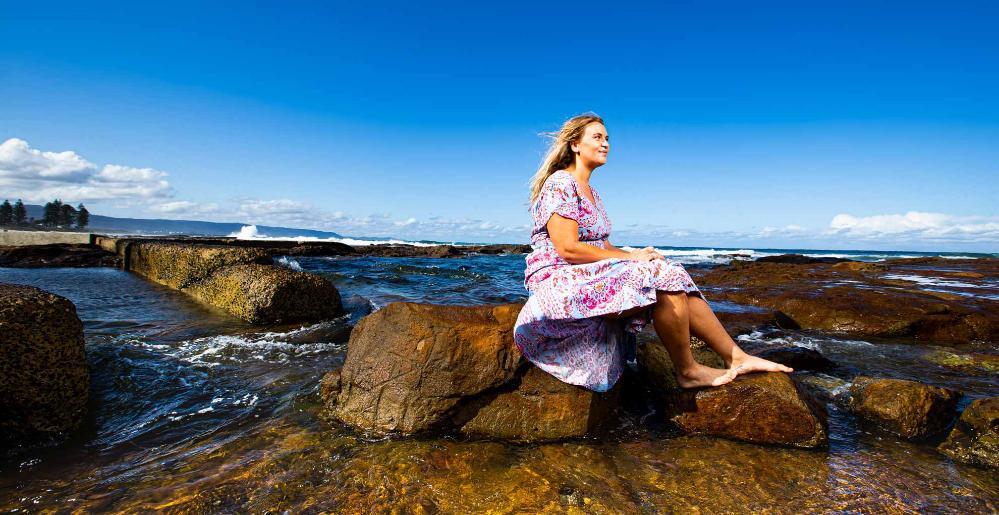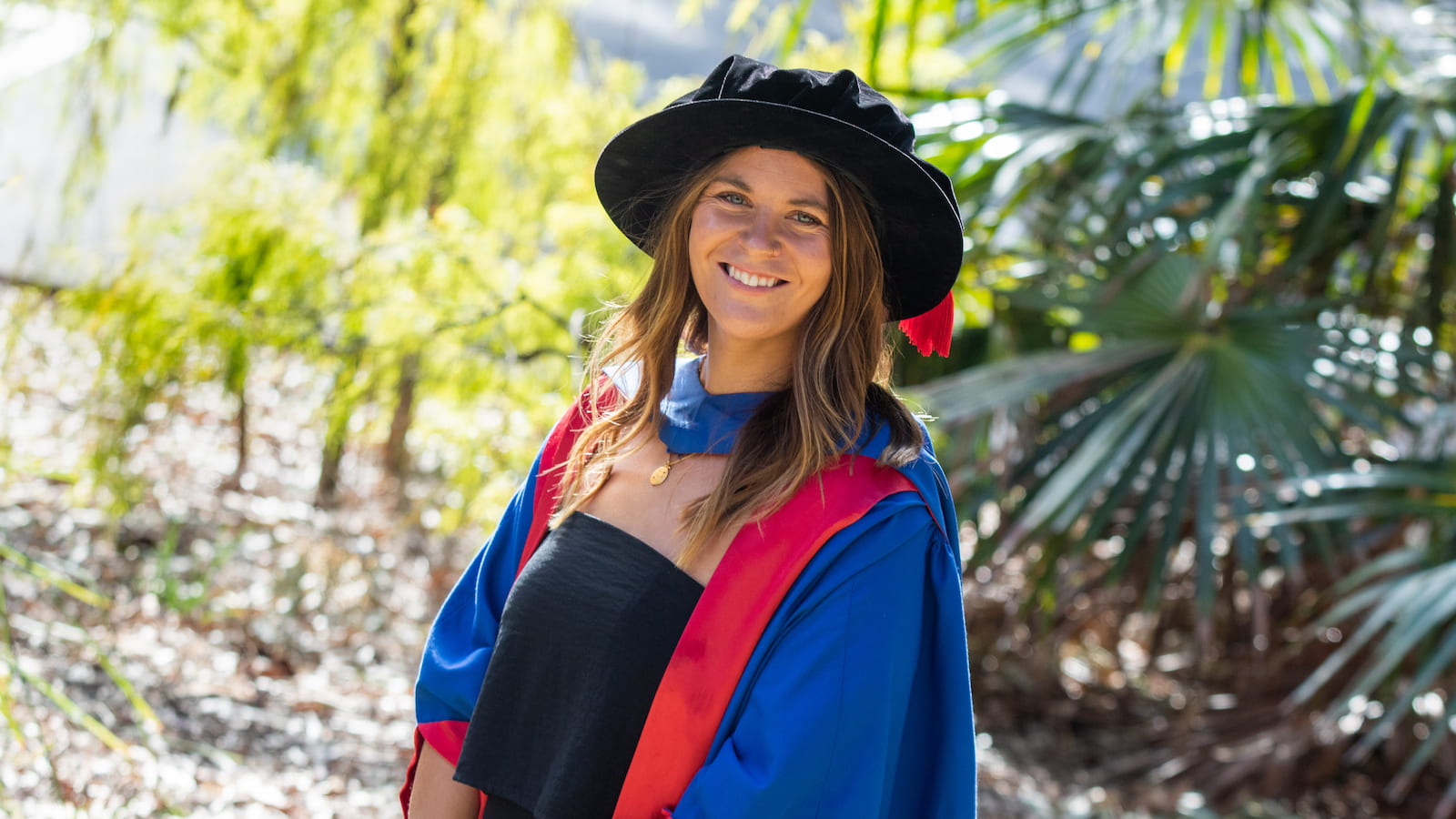November 2, 2023
How a love of the ocean led to Dr Freya Croft’s PhD
Researcher focused on how awe-inspiring experiences encourage conservation of the natural world
The first time Dr Freya Croft visited Ningaloo Reef, a World-Heritage site on the south-west coast of Western Australia, she had what can only be described as an emotional experience. She fell in love with the region and with the captivating creatures that call the crystal-clear water home.
“I absolutely loved it,” said Dr Croft, who travelled to the region with her family in the first year of her PhD.
“We did a manta ray tour in Coral Bay that was just incredible. In the one day we were able to swim with multiple manta rays, a tiger shark, and dive down into the middle of a gigantic bait ball. We also saw an incredible display of humpbacks breaching in unison.”
While this experience had a profound impact on Dr Croft’s life, it also provided the spark, the impetus, for her research moving forward.
“I remember just being in awe of Ningaloo Reef and I knew at that point that I wanted my research to focus on Ningaloo. It is such a beautiful and unique environment.”
Dr Croft’s thesis, titled, Swimming with Giants. Understanding and Harnessing the Potential of Embodied, Emotional and Temporal Encounters with Marine Megafauna on Ningaloo Reef, examined the connections between human behaviour and the natural world.
Can awe-inspiring experiences, such as swimming with whale sharks, change the way people see the world? And can it encourage them to become more sustainable in their behaviour?
“I was focused on marine tourism as a way to facilitate conservation outcomes, and the potential to foster an ongoing and meaningful connection between people and the natural world,” Dr Croft said. “I wanted to see if being in the water with marine megafauna was a catalyst for change for the tourists undertaking the experience. How does it change their attitude towards the environment more broadly? I am fascinated in the role that emotions play in our daily life, and the ways in which they influence our behaviour choices and the decisions that we make.”
“The future of the world’s coral reefs is quite uncertain. It is often easy to get bogged down in the immense and often seemingly insurmountable issues facing the world’s oceans, particularly the fate of coral reefs, and sometimes it is hard to see solutions through this.
“Social science and examining the way humans interact with the environment is such an important part of bringing about change. It is important to stay optimistic and do as much as you can to shed light on any possible solutions and to help make people aware of the way their behaviour may influence conservation outcomes.”
Dr Croft yesterday (Wednesday 1 November) graduated from the University of Wollongong (UOW) with a PhD from the Australian Centre for Culture, Environment, Society and Space.
It has been a fascinating, tough, and at times wild, ride to completing her degree. But Dr Croft said her passion for her topic and her support system, including her family and her supervisors, Associate Professor Michael Adams and Associate Professor Jenny Atchison, were instrumental in helping her over the line.
“I think every PHD involves trials and obstacles. It is a worthwhile experience and I am glad I did it, but it is certainly not an easy task. At times, writing a thesis felt like an endless battle.”
There were also many highs during Dr Croft’s PhD journey. In 2019, she was one of only 10 students globally to receive a prestigious Blue Charter Fellowship from The Association of Commonwealth Universities, which allowed her to travel to New Zealand to research marine and plastic pollution. She also had the chance to take part in research projects across the university that brought together her love of the ocean and her background in history.

Dr Freya Croft, pictured in 2019 in Wollongong. Photo: Paul Jones
Dr Croft also considers herself fortunate to have had the opportunity to spend time exploring topics that fascinate her in one of the most beautiful environments in the world.
“It can be easy to get caught up in the stressful and hard aspects of doing a PhD but at the end of the day, it always helps to remember that this is a such a unique opportunity,” she said. “You work on something that you love and your own pace and get to dedicate a number of years to learning and thinking deeply about really interesting topics.
“I feel very lucky that I was able to conduct research in this area, as I spent three months doing fieldwork at Ningaloo Reef. This meant that I got to be out on the reef most days and had awesome opportunities to swim with humpbacks, whale sharks, manta rays and all the other incredible marine life at Ningaloo. I have had a long-term dream of swimming with humpback whales, and I got to do this while I was in Ningaloo. They’re such beautiful and impressive animals and to be in the water with them and seeing them swim underneath you was absolutely awesome – and was a real privilege.”
Growing up in Bathurst, Dr Croft was not surrounded by the ocean. But it was on family holidays to the South Coast and to the Great Barrier Reef that she fell in love with the beauty and majesty of the water. As soon as she could she relocated to Wollongong, so she could be close to the sea, and undertook a Bachelor of Arts and International Studies, with an Honours year in History. She found her way into human geography and decided to focus on environmental and conservation-related issues in her PhD.
Dr Croft has harnessed that early passion for the ocean into a bright academic career. After completing her PhD, she is now a Post Doctoral Research Fellow at UOW’s Australian National Centre for Ocean Resources and Security (ANCORS). As part of the Blue Futures Translational Research Initiative, her work focuses on what communities in the Illawarra and South Coast want for the future of the coast and ocean, and the social dimensions of emerging blue industries, such as kelp and offshore wind, and the process of energy transition.
It has been a long road to graduation after beginning her thesis in 2017, but Dr Croft was incredibly thankful for the support and guidance she has received along the way.
“Firstly, I would like to thank my parents. I am grateful to them for being so supportive throughout my PhD.
“Associate Professor Michael Adams and Associate Professor Jenny Atchison were fantastic supervisors who became mentors to me. I am very grateful for all of the support, time and advice that they have given me. They were extremely patient, kind, and wonderful.
“Associate Professor Michelle Voyer was also a fabulous mentor. She is now my supervisor at ANCORS and I love working with her – she is a great example of awesome women in leadership. Michelle gave me a lot of support in the final months of my PhD and has helped me transition into an academic role. I am very grateful to her, as I would not be in this position without her guidance and help.”
